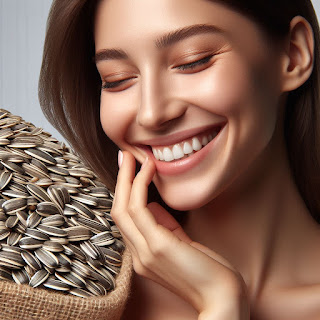▪Introduction
Sunflower is a plant that belongs to the Asteraceae family, which includes daisies and chrysanthemums. It is native to North America, but it is now cultivated in many parts of the world for its beautiful flowers and edible seeds. Sunflower seeds are rich in nutrients and health benefits, as they contain protein, healthy fats, vitamins, minerals, and antioxidants. Sunflower oil is also extracted from the seeds and used for cooking, cosmetics, and biodiesel. In this article, we will explore some of the benefits of sunflower and how to use it.
▪Health Benefits of Sunflower
Sunflower has many health benefits, such as:
- Improving heart health: Sunflower seeds are a good source of vitamin E, which is a powerful antioxidant that protects the cells from damage and reduces the risk of heart disease and stroke. Sunflower seeds also contain polyunsaturated and monounsaturated fats, which are healthy fats that lower the levels of bad cholesterol and raise the levels of good cholesterol in the blood. ¹²
- Strengthening bone health: Sunflower seeds contain calcium, magnesium, phosphorus, and copper, which are important minerals for building and maintaining bones and teeth. Sunflower seeds also contain vitamin K, which is a vitamin that helps fix calcium in the bones and prevents it from leaking to other tissues. ³
- Boosting immunity: Sunflower seeds contain zinc, selenium, iron, and copper, which are minerals that play a vital role in activating and enhancing the immune system and fighting infections and inflammations. Sunflower seeds also contain vitamin B6 and folate, which are vitamins that help form blood cells and transport oxygen to the tissues.
- Improving skin and hair health: Sunflower seeds contain vitamin E and biotin, which are vitamins that protect the skin from dryness, wrinkles, spots, and burns. Sunflower seeds also contain essential fatty acids, which are fats that moisturize the skin and hair and give them shine and softness.
- Regulating blood sugar levels: Sunflower seeds contain dietary fiber, which helps regulate the absorption of sugar from the intestines and maintains the blood sugar levels within the normal range. Sunflower seeds also contain chromium, which is a mineral that helps improve the cells' response to insulin and prevents sudden spikes or drops in sugar.
▪How to Use Sunflower
Sunflower can be used in various ways, such as:
- Eating the seeds as a snack or a crunchy, either raw, roasted, salted, or sweetened.
- Adding the seeds to salads, soups, bread, cakes, cookies, desserts, or snacks to increase the nutritional value and taste.
- Extracting the oil and using it for cooking, frying, dressing, or applying on the skin or hair.
- Grinding the seeds and turning them into butter, jam, sauce, or plant-based milk.
▪Conclusion
Sunflower is a plant that offers many benefits for health, beauty, and environment. It contains many nutrients and antioxidants that improve the functions of various body organs and prevent diseases. Sunflower can be used in different forms and methods in food or personal care. It is recommended to consume sunflower in moderate and appropriate amounts to benefit from its advantages without harming health. 🌻







0 Comments